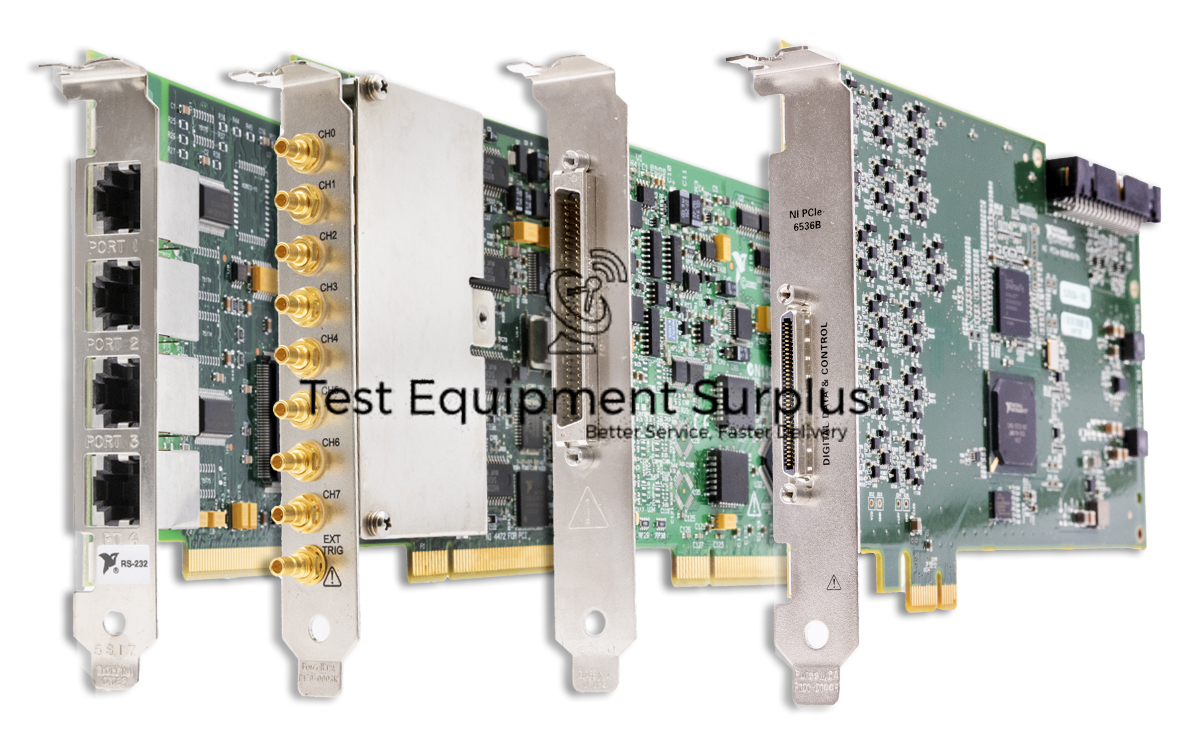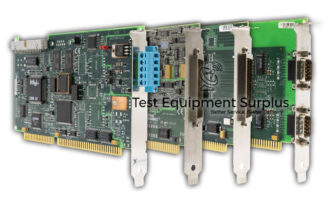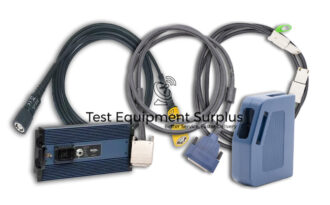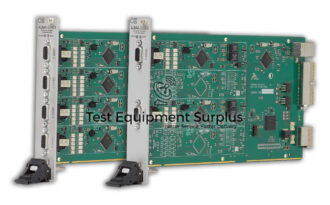Description
The National Instruments PCIe-4065 (Part Number: 779771-01) is a highly precise 6½-digit Digital Multimeter (DMM) capable of a variety of measurement tasks including current, voltage, diode testing, and resistance. It boasts a maximum reading rate of 3000 samples per second at 4½ digits with a 15 bits resolution, and a minimum reading rate of 10 samples per second at 6½ digits with a 22 bits resolution.
The device features a DC voltage measurement range from 100 millivolts to 300 volts, and a DC current range of 10 milliamperes to 3 amperes. For alternating current measurements, the voltage range is 200 millivolts rms (±320 millivolts peak) to 300 volts rms (±425 volts peak), and the current range is 10 milliamperes rms (±15 milliamperes peak) to 3 amperes rms (±4.2 amperes peak). The PCIe-4065 can measure resistance using either a two-wire or four-wire method and ensures safety with an isolation voltage of ±300 volts.
Before initial use, a 30-minute warm-up time is required for the device to perform optimally. To maintain accuracy and reliability, it is recommended that the PCIe-4065 is calibrated at least once per year.
| Feature | Specification |
|---|---|
| Part Number | PCIe-4065 |
| National Instruments Part Number | 779771-01 |
| Digits | 6½ |
| Measurement Capabilities | Current, Voltage, Diode Test, Resistance |
| Maximum Reading Rate | 3000 S/s at 4½ digits (15 bits resolution) |
| Minimum Reading Rate | 10 S/s at 6½ digits (22 bits resolution) |
| DC Voltage Range | 100 mV to 300 V |
| DC Current Range | 10 mA to 3 A |
| AC Voltage Range | 200 mVrms (±320 mVp) to 300 Vrms (±425 Vp) |
| AC Current Range | 10 mArms (±15 mAp) to 3 Arms (±4.2 Ap) |
| Resistance Measurement Types | Two or Four Wire Resistance |
| Isolation Voltage | ±300 V |
| Warm-Up Time | 30 minutes |
| Recommended Calibration Period | At least once a year |
Question 1: What are the specific features and recommended calibration frequency for the National Instruments PCIe-4065, Part Number 779771-01?
Answer 1: The National Instruments PCIe-4065 Digital Multimeter can accurately measure DC current ranging from a minimum of 10 milliamperes to a maximum of 3 amperes.
Question 2: What is the measurement capability and maximum isolation voltage of the National Instruments PCIe-4065 Digital Multimeter?
Answer 2: The maximum reading rate of the National Instruments PCIe-4065 Digital Multimeter when set to 4½ digits with 15 bits resolution is 3000 samples per second.
Question 3: What is the maximum reading rate in samples per second of the National Instruments PCIe-4065 Digital Multimeter when set to 4½ digits with 15 bits resolution?
Answer 3: The National Instruments PCIe-4065 Digital Multimeter can perform measurement tasks such as measuring current, voltage, testing diodes, and resistance. Its maximum reading rate is 3000 samples per second at 4½ digits with a resolution of 15 bits, while its minimum reading rate is 10 samples per second at 6½ digits with a resolution of 22 bits.
Question 4: What are the minimum and maximum DC current ranges that the National Instruments PCIe-4065 Digital Multimeter can accurately measure?
Answer 4: The National Instruments PCIe-4065 Digital Multimeter is capable of measuring current, voltage, resistance, and performing diode testing with a maximum isolation voltage of ±300 volts.
Question 5: What measurement tasks can the National Instruments PCIe-4065 Digital Multimeter perform, and what are the specifics of its reading rate and resolution at both maximum and minimum settings?
Answer 5: The National Instruments PCIe-4065, Part Number 779771-01, is a 6½-digit Digital Multimeter featuring a maximum reading rate of 3000 samples per second at 4½ digits, a DC voltage measurement range of 100 millivolts to 300 volts, a DC current range of 10 milliamperes to 3 amperes, AC voltage and current measurement capabilities, resistance measurement with two-wire or four-wire methods, and an isolation voltage




